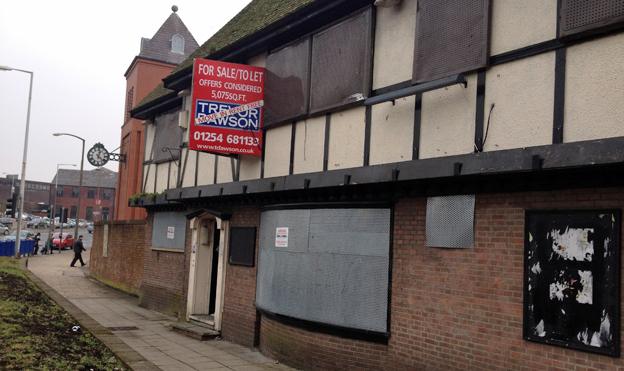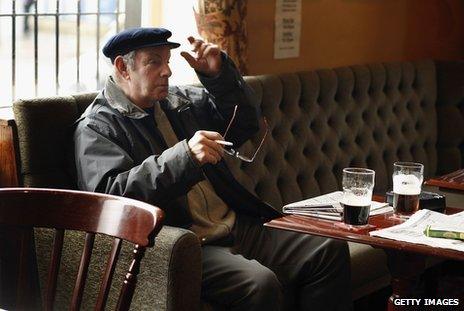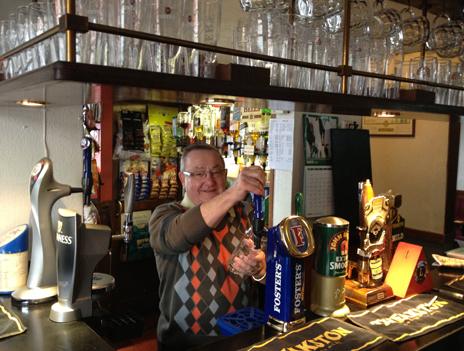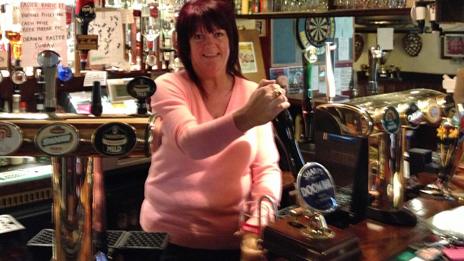The places where the pubs are boarded up
- Published

The Great British Beer Festival is under way - a celebration of real ale and British pub culture. But in some parts of the UK, pubs are in perilous decline.
"After a match we often meet our wives for a quiet drink in the local."
It was probably stretching credibility, even in those supposedly more innocent times, to imagine a national sporting icon, a hero of England's World Cup winning team, playing darts in his local pub.
But however dated and clumsy it looks now, Bobby Moore's late 1960s TV ad, external urging couples, like him and "Mrs Bobby Moore", to "look in at the local" captures a turning point in the nation's drinking culture.
The local pub, a traditional bastion of male-dominated working-class life, was having to adapt to changing times.
Forty years later, it is still a feature of life in the UK, but there are some parts of the country where it is dying. One such place is Blackburn, in Lancashire.
It is not exactly news that pubs have been closing at a rapid rate in recent years. A combination of the smoking ban, external, cheap alcohol in supermarkets and the economic downturn have been widely blamed for leaving publicans in many parts of the country struggling to carry on.
The 2003 Licensing Act, with its relaxation of opening hours, turned out to be another nail in the coffin of many locals, increasing staff costs and accelerating the trend towards late-night bar culture in the centre of towns.
But according to research by drinks trade analysts CGA, there have been more pub closures in Blackburn than just about anywhere else in the UK. In the year to December 2012, nearly 20% of the town's licensed premises, 28 pubs in total, called last orders for the final time.

Regulars are increasingly thin on the ground
It is a similar story across the North West of England, with Bolton, Oldham and Preston all in the top 10 of towns and cities with highest closure rates. Some smaller towns, such as Ossett, in Yorkshire, where 22% of the pubs disappeared last year, have seen a higher closure rate, but from a much smaller base.
Greenhithe, in Kent, and Chigwell, in Essex, have lost more than half of their pubs between 2007 and 2012, proving it is not just a northern phenomenon.
The figures do not come as a surprise to Geoff Sutcliffe, landlord of Blackburn's The Rising Sun, one of the few pubs outside the town centre not to have been boarded up or converted into flats, shops or restaurants. But he is sanguine about the changing nature of the trade.
"The drinking culture has changed immensely over the years," he says. "The youngsters have that much else to enjoy themselves with, or use their spare time. They don't need to go in pubs.
"In our day, we used to be taken to the pub by our fathers when we were 18, and he would buy us our first pint, or what he thought was our first pint. It was a part of our everyday life. The pub trade is struggling now, because the youngsters will go out once or twice at the weekend and they'll spend a fair amount of money, but during the week they don't seem to go out."

Geoff Sutcliffe pours pints for an older demographic
A licensee for more than 30 years, Sutcliffe's pub is a spotless monument to the golden age of the local. Bobby Moore would probably have found its polished wooden benches and cosy, music-free environs a bit old fashioned.
Sutcliffe has preserved many of the original 19th Century features, including the vault, a snug bar that as late as the 1970s was an exclusively male enclave, where beer was a penny a pint cheaper.
These days, The Rising Sun is proudly unisex. Its customers are mostly retired people who like to drop by for a chat with friends and a game of dominoes.
"The youngsters call this place The Rising Dead," jokes Sutcliffe. He does not see much of a future for the traditional local boozer.
"I would say that in another 20 years or so we will end up like the Continent where all there will be is cafe-style bars in town centres and that's the way the trade will survive. When this generation disappears so will the local pub."
Not everyone is as gloomy about the future of the trade. Across town, landlady Carol Davies is trying to keep her head above water with a hyperactive programme of quizzes and entertainment at the Clifton Arms.
"It has become tougher, more difficult, with the prices and people losing their jobs. We don't have the same trade as we did years ago," she says.
There is a "domino effect" when pubs close, she says. Darts and football leagues start to thin out, customers get into the habit of socialising or drinking at home. More pubs have to close their doors.
By far the biggest problem, according to pub-goers and publicans in Blackburn, is cheap supermarket booze.
"The supermarket prices are so unreal that people are choosing to buy beer and drink it at home," says Davies. "I probably have eight or nine gentlemen that are by themselves and they want to come out to talk to other people and some of them can't do that any more."

Carol Davies fills her pub with the help of quizzes and entertainment
So what happens to all of these abandoned pubs when they have pulled their final pint? Towns like Blackburn with large Muslim populations have seen some of them converted into Islamic centres or mosques in recent years.
Salim Mullah, chairman of the Lancashire Council of Mosques, says former pubs make good mosques or madrassas, serving a similar purpose for the local community as the pub, but without the alcohol.
"When pubs or other kinds of public buildings become available, the Muslim community tend to purchase them and renovate them. It becomes part of their life. It is where local services are accessed. They are situated centrally, in the heart of the community."
In many parts of the country, supermarkets are taking over.
"A decade or 15 years ago, pubs that were originally cinemas in the centre of towns were being turned into apartments. Either that or converted or bulldozed," says Jon Collins, chief executive of CGA strategy.
"That fell out of favour. It is more supermarkets now. They make perfect sites for Tesco Metros or similar. It is almost adding insult to injury. Supermarkets are seen as the prime cause of pubs closing down and they are taking over those sites."
The pub trade received an unexpected boost in this year's Budget when Chancellor George Osborne cut tax on a pint of beer and scrapped the so-called beer duty escalator, which guaranteed above inflation price rises.
It was a victory for The Campaign for Real Ale, which immediately designated April as Community Pubs Month. It urged changes to the planning laws and other reforms to protect pubs.
"There is now a need for everyone to work together to help reverse the decline in pub-going and put this great British industry firmly back on the map," said Camra chief Mike Benner.
So there may be light at the end of the tunnel. Pub closures have slowed from a peak of 52 a week in 2008 to 18 in the final quarter of last year, according to CGA. Collins still expects a further 5,000 pubs to close by 2018 but, he says, there are signs that a new kind of local is springing up.
These are neighbourhood bars that stay open late at weekends, with DJs and food, attracting a younger crowd, who go out once or twice a week as a "treat". The sort of place the modern equivalent of "Mr and Mrs Bobby Moore" might drop in for a couple of drinks in fact.
You can follow the Magazine on Twitter, external and on Facebook, external